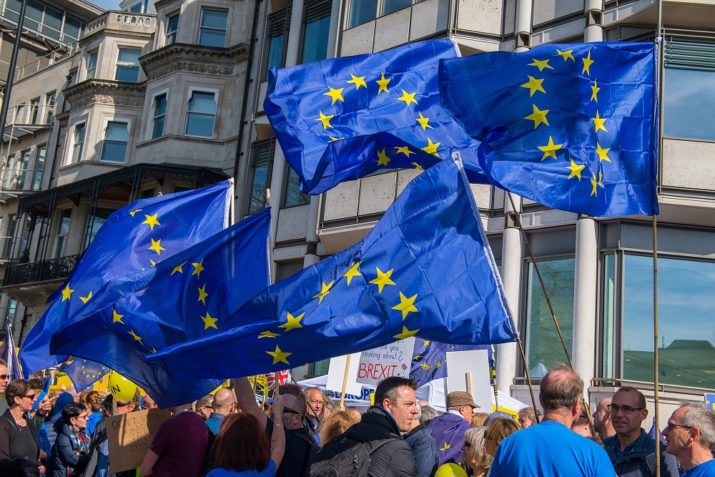
Social Europe: Identity, Citizenship, and the Welfare State

This is part of our special feature on The Crisis of European Integration.
Course Description
With European economic integration a reality and the sovereign debt crisis of the Euro an on-going problem, the social and political questions that in the past had remained in the background have returned to center stage. The refugee crisis, with seemingly unending masses of migrants coming from the war-torn Middle East, only adds to the social and political issues confronting Europe. Concerns about political legitimacy and national democracy in the multi-level European Union have also increasingly come to the fore, as decision-making authority has slowly but surely moved up to the EU level. The “no” votes in the referenda on the Constitutional Treaty in France and the Netherlands and in Ireland for the Lisbon Treaty suggest that already in the mid 2000s national publics had become increasingly concerned about the challenges from European integration to national identity and sovereignty as well as to the welfare state. The Lisbon Treaty of 2009 may have taken care of the institutional issues, but it did not address the issues of policy or democracy at the heart of citizen concerns in the member-states. The rise of the extremes on the right and the left demonstrates that citizens’ concerns have only intensified in response to the multiple crises.
Although ‘social Europe’ is a relatively new area of concern, EU policies on employment, welfare, gender and immigration have already greatly affected national policies and practices. The EU’s initiatives on gender, whether through Commission-inspired directives or European Court of Justice decisions, have had a profound impact on women’s rights and employment. The EU Charter on Fundamental Rights is equally important for the protection of individual rights throughout the Union. But the EU’s failure to come to a common agreement on immigration has become particularly problematic during the refugee crisis, in particular given member-states very different responses to that crisis—from open arms to barbed wire fences.
Finally, the EU has had a significant impact on the welfare state, which has itself been under great pressure since its “Golden Age” in the postwar period. No course on ‘social Europe’ would be complete without considering the profound changes in national social and employment policies since the 1970s. These changes are the result of external economic pressures, global and European, as well as of internal political dynamics. And they can only be explored on a country by country basis, in order to understand the differences in responses following from differences in postwar policy legacies; in the impact of the economic crisis beginning in the mid-1970s as well as the major crisis beginning in 2008; in the preferences that played themselves out in electoral politics; and in the ideas and discourses through which national politicians sought to legitimate the reforms.
This course, in short, seeks to consider the past, present, and future of “social Europe.” It begins with a focus on the impact of European political as well as economic integration on national identities, cultures, politics, and citizenship, follows with an examination of the policies that have had or will have the greatest impact on these social constructions, and ends with an examination of the changes in the welfare state over time. In many sessions, moreover, in addition to considering the long standing academic discussions of the Social Europe, we will debate the current crises and their responses, including borders and possible British exit from the EU; the Greek “tragedy” in the Eurozone crisis; the turn to ‘illiberal democracy’ in Hungary and Poland; what to do about gender-based glass ceilings; the refugee crisis as a human rights issue, an integration issue, and a political issue; and the impact of the Eurozone crisis on labor and social policy.
Course Outline
Introduction: What is Social Europe?
The Building Blocks: Identity, Citizenship, and Democracy
1. Identity and Culture
2. Identity and Borders
3. Identity and Democratic Legitimacy
4. Identity, Citizenship, Legitimacy, and the Euro
5. Identity, Democracy, and the Political Extremes
EU Policies for a Social Europe
1. EU Gender Issues
2. EU Human Rights Policies: Inside and Outside
3. EU Immigration and Integration
4. EU Immigration, Integration, and Politics
The Underpinnings: European Welfare State and Social Justice
1. EU Social Policy and National Welfare States
2. National Economic and Social Policy Reforms, Values, Discourse
Conclusion and Class Presentations
Required Texts
Art, David, (2011) Inside the Right Cambridge: Cambridge University Press.
Cerutti, Furio, Lucarelli, Sonia and Schmidt, Vivien, eds. (2011) Debating Political Identity and Legitimacy in the European Union. London: Routledge,
Hay, Colin and Wincott, Daniel (2012) The Political Economy of European Welfare Capitalism Basingstoke: Palgrave Macmillan.
Hochschild, Jennifer and Mollenkopt, John H. Bringing (2009) Outsiders In: TransAtlantic Perspectives on Immigrant Political Incorporation Ithaca: Cornell.
Joppke, Christian (2010) Veil: Mirror of Identity London: Polity Press.
Kantola, Johanna (2010) Gender and the European Union Basingstoke: Palgrave Macmillan
McNamara, Kathleen (2015) The Politics of Everyday Europe Oxford: Oxford University Press.
Moro, Giovanni The Single Currency and Citizenship: Unveiling the Other Side of the Coin Bloomsbury Academic 2013.
Risse, Thomas (2010) A Community of Europeans? Ithaca: Cornell University Press
Zippel, Kathrin S. (2006) The Politics of Sexual Harassment Cambridge University Press.
Syllabus
Introduction: What is Social Europe?
Class 1
A. The Building Blocks: Identity, Citizenship, and Democracy
1. Identity and Culture
Class 2
- McNamara, Kathleen, The Politics of Everyday Europe Oxford: Oxford University Press, 2015, pp. 1- 90
- Risse, Thomas, Community of Europeans? (Ithaca: Cornell University Press, 2010), pp. 19-106
- Sonntag, Albrecht, “False expectations: the counterproductive side effects of the EU’s use of political symbols” in “Debating Political Identity and Legitimacy in the European Union” eds. Furio Cerutti, Sonia Lucarelli, and Vivien A. Schmidt. (London: Routledge, 2011), pp. 115-130
- *US-British comparison: Sarah Lyall, “TaTa.London.Hello.Awesome,” New York Times Aug. 18, 2013 http://www.nytimes.com/2013/08/18/opinion/sunday/ta-ta-london-hello-awesome.html?_r=0
- *Henning Wehn on Dave’s One Night Stand (German stand-up comic in and on Scotland) http://www.youtube.com/watch?v=MNNCqAmZzTA
2. Identity and Borders
Class 3
- Risse, Thomas, “Widening” in Community of Europeans p. 204-225
- McNamara, Kathleen, “Citizenship and Mobility” in The Politics of Everyday Europe, pp. 91-112
- Lucarelli, Sonja, “Mirrors of us: European political identity and the Others’ image of the EU” in “Debating Political Identity and Legitimacy, pp. 148-167
- McNamara, Kathleen, “European Foreign Policy” in The Politics of Everyday Europe, pp. 135-160.
Debate: The British Referendum: Brexit as a case of identity and borders?
- *Jean-Claude Piris “Should the British Exit from the EU?” Robert Schuman Foundation no. 355 (May 2015) www.robert-schuman.eu/en/doc/questions-d-europe/qe-355-en.pdf
- * Simon Hix ‘Is the UK Marginalized in the EU?” Social Europe Journal Oct 2015 http://www.socialeurope.eu/2015/10/is-the-uk-marginalised-in-the-eu/
- * John Olver on Brexit: https://www.youtube.com/watch?v=iAgKHSNqxa8&feature=youtu.be
3. Identity and Democratic Legitimacy
Class 4
- Cerutti, Furio “How not to (mis)understand political identity in the European Union in Debating Political Identity and Legitimacy eds. Cerutti, Lucarelli, and Schmidt, pp. 3-15.
- Levrat, Nicolas, “Do the powers exerted by the EU need a legitimacy based on the citizens’ European identity? in “Debating Political Identity and Legitimacy, pp. 76-90
- Schmidt, Vivien “Democracy and Legitimacy in the European Union Revisited: Input, Output, and ‘Throughput,’” Political Studies vol. 61, no. 1 (2013): 2-22 (download from ejournals or will email)
- Sara B. Hobolt and James Tilley (2014) “Who’s in Charge? How Voters Attribute Responsibility in the European Union” Comparative Political Studies 47: 795 (ejournals) DOI: 10.1177/0010414013488549
3. Identity, Citizenship, Legitimacy, and the Euro
Class 5
- McNamara, Kathleen, “The Euro and the Single Market” in The Politics of Everyday Europe, pp. 113-134.
- Schmidt, Vivien A. “ The Forgotten Problem of Democratic Legitimacy: ‘Governing by the Rules’ and ‘Ruling by the Numbers’.” Chapter for The Future of the Euro, eds. Mark Blyth and Matthias Matthijs (New York: Oxford University Press, 2015) (download from ebooks, Oxford Scholarship online)
- Giovanni Moro, “Building Citizenship in the post-Modern Era: Dimensions of the other side of the coin” in The Single Currency and Citizenship ed., G. Moro
- Shore, Chris. “Divided by a Common Currency: The Euro Crisis and European Citizenship” in The Single Currency and Citizenship ed., G. Moro.
- Heidbreder, Eva “Why money can’t buy Democracy: On the Detachment of the Euro from EU citizenship” in The Single Currency and Citizenship ed., G. Moro
Debate: The Greek Eurozone Crisis
- *Anna Sauerbrey, “European Political Poker, International New York Times, August 10, 2015 http://www.nytimes.com/2015/08/10/opinion/anna-sauerbrey-european-political-poker.html?_r=0
- * Jürgen Habermas on the Greek debt Deal, The Guardian, July 16, 2015 http://www.theguardian.com/commentisfree/2015/jul/16/jurgen-habermas-eu-greece-debt-deal
- *Ian Parker “The Greek Warrior” (on Varoufakis) The New Yorker Aug 3, 2015 www.newyorker.com/magazine/2015/08/03/the-greek-warrior
4. Identity, Democracy, and the Political Extremes
Class 6
- Art, David, Inside the Right (Cambridge: Cambridge University Press, 2011) (esp pp. 106-230)
- Minkenberg, Michael, “Anti-Immigrant Politics in Europe: The Radical Right, Xenophobic Tendencies, and Their Political Environment” in Bringing Outsiders In: TransAtlantic Perspectives on Immigrant Political Incorporation eds., J. Hochschild and J. Mollenkopf (Ithaca: Cornell, 2009)
- European Forum: The Rise of the Far Right? In APSA European Politics and Society Newsletter read articles by David Art, Terri Givens, Michael Minkenberg, Cas Mudde (download Winter 2014 at http://community.apsanet.org/eps/newsletter )
- * http://www.theguardian.com/world/2014/nov/16/across-europe-disillusioned-voters-turn-to-outsiders
Debate: Extremes in Power–Hungary and Poland as Illiberal Democracies?
- * Dan Kelemen and Mitchell Ornstein, “Europe’s Autocracy Problem” Foreign Affairs Jan. 7, 2016 https://www.foreignaffairs.com/articles/poland/2016-01-07/europes-autocracy-problem (or get via bu library)
- * http://www.euractiv.com/sections/eu-priorities-2020/polands-law-and-justice-party-losing-its-lustre-321075
- * Dan Kelemen, “Europe’s Hungary Problem” Foreign Affairs Sept. 20, 2015
- * Center for European Reform, “Hungary and the West: We need to talk about Victor” November 2014 http://www.cer.org.uk/insights/hungary-and-west-we-need-talk-about-viktor
- * https://www.theguardian.com/commentisfree/2016/oct/13/hungary-future-europe-far-right-viktor-orban
B. EU Policies for a Social Europe
1. EU Gender Issues
Class 7
- Kantola, Johanna Gender and the European Union (Basingstoke: Palgrave Macmillan, 2010), Chapters 1-6, pp. 1-147.
- Zippel, Kathrin S. The Politics of Sexual Harassment (Cambridge University Press, 2006), Chapters 3-5, pp. 82-201
- Heather Macrae: “The EU as a Gender Equality Polity: Myths and Realities” in Journal of Common Market Studies, vol. 48, issue 1, 2010, pp. 155 – 174. [download from e-journals]
Debate: Why should anything be done about Glass Ceilings in politics or business?
- * Georgina Waylen, “Gender, Institutions, and the Quality of Democracy” Quality of Government Institute (2015) https://www.google.com/search?q=waylen+Gender%2C+Institutions+and+the+Quality+of+Democracy&ie=utf-8&oe=utf-8
- * Germany sets Gender Quotas in Boardrooms New York Times (March 2, 2015) http://www.nytimes.com/2015/03/07/world/europe/german-law-requires-more-women-on-corporate-boards.html
2. Human Rights Policies: Inside and Outside
Class 8
- *“The Charter of Fundamental Human Rights.” European Union document. (http://www.europarl.europa.eu/charter/default_en.htm ) See also: http://europa.eu/pol/rights/index_en.htm for the EU on Human Rights more generally
- Türkeş, Merzuka Selin, “Human Rights in the European Union’s Foreign Policy: Universal in Discourse, Flexible in Practice” Recon Online Working Paper 2011/21 (August 2011) Find at: http://www.reconproject.eu/projectweb/portalproject/RECONWorkingPapers2011.html
- *Council of Europe, “Safeguarding Human Rights in times of Crisis,” Issue paper November 2013. download http://www.enetenglish.gr/resources/article-files/prems162913_gbr_1700_safeguardinghumanrights_web.pdf
- * “What has the European Convention on Human Rights ever done for us?”—funny video by the Guardian (April 25, 2016) in light of the British referendum debates prior to the vote. See: video or https://www.facebook.com/theguardian/videos/506897629498005/
Debate: The Refugee Crisis as a Human Rights Issue
- * Human Rights Watch on Europe’s Refugee Crisis: https://www.hrw.org/report/2015/11/16/europes-refugee-crisis/agenda-action
- * “Mandatory Pork: Menu Rule in Denmark…” New York Times Jan 20, 2016 http://www.nytimes.com/2016/01/21/world/europe/randers-denmark-pork.html
- A proposal for reform of Asylum Policy, FEPS (Foundation for Progressive European Studies): http://www.feps-europe.eu/assets/e395b30f-68a6-4781-957d-38ad1a89a043/call-to-europe-iv-twelve-proposalspdf.pdf
3. EU Immigration and Integration
Class 9
- Hochschild, Jennifer and Mollenkopf, John, Bringing Outsiders In: TransAtlantic Perspectives on Immigrant Political Incorporation Ithaca: Cornell, 2009), Chapter 1 “Setting the Context,” Ch. 1, pp. 3-14
- Martiniello, Marco, “Immigrants and Their Offspring in Europe as Political Subjects” in Bringing Outsiders In, Chap. 3, 33-47
- Duyvendak, Jan Willem, Pels, Trees, and Rijkschroeff, Rally, “A Multicultural Paradise? The Cultural Factor in Dutch Integration Policy” in Bringing Outsiders In Chap. 9, pp., 129-139
- Modood, Tariq, “The State and Ethno-Religious Mobilization in Britain” in Bringing Outsiders In” Ch. 15, pp. 233-249.
- Immigration and Integration Forum European Politics and Society Newsletter APSA http://community.apsanet.org/eps/newsletter download summer 2015
4. EU Immigration, Integration, and Politics
Class 10
- Joppke, Christian Veil: Mirror of Identity (London: Polity Press 2010), entire
- Lauren McClaren, “The Cultural Divide in Europe: Migration, Multiculturalism, Political Trust,” World Politics, Vol. 64, no. 2, (2012): 199-241
- The Roma: http://www.newyorker.com/magazine/2014/01/13/the-people-who-pass
The Refugee Crisis as Political Issue
- * “Barbed Wire Rhetoric” Financial Times Nov. 6, 2015 http://www.ft.com/intl/cms/s/0/fd9db706-9296-11e5-bd82-c1fb87bef7af.html?siteedition=intl#axzz3xtSkdkis
- * “Backlash over Refugees leaves Merkel Looking Vulnerable” Financial Times Nov. 13, 2015 http://www.ft.com/intl/cms/s/0/3a4c96ea-8a27-11e5-90de-f44762bf9896.html#axzz3xtSkdkis
- * “EU Refugee Crisis: End of an Ideal” Financial Times, Sept 4, 2015 http://www.ft.com/intl/cms/s/0/416d5eb0-52ea-11e5-b029-b9d50a74fd14.html#slide0
C. The Underpinnings: European Social Welfare and Social Justice
1. EU Social Policy and National Welfare States
Class 11
- Hay, Colin and Wincott, Daniel The Political Economy of European Welfare Capitalism (Basingstoke: Palgrave Macmillan, 2012), entire
- Bruzelius, Cecilia, Chase, Elaine, and Seeleib-Kaiser, Martin (2014) “Semi-Sovereign Welfare States, Social Rights of Citizens, and the Need for Strong State Capacities” SE Journal Oxford Institute of Social Policy and Friedrich Ebert Stiftung, no 3 (Dec.) http://www.feslondon.org.uk/cms/files/fes/pdf/FES%20Seeleib%20Oxford%2012%202014%20Welfare%20States.pdf
- Erne, Roland (2015) “A supranational regime that nationalizes social conflict: Explaining European trade unions’ difficulties in politicizing European economic governance,” Labor History, 56:3, 345-368 (get from ejournals)
2. National Economic and Social Policy Reforms, Values, and Discourse
Class 12
- Schmidt, Vivien A. “Values and Discourse in the Politics of Adjustment” in Welfare and Work, vol. 1 ed. Scharpf and Schmidt, pp. 229-309. (Will email)
- Mark Thomson, “Democracy, Inclusion and the Governance of Active Social Policies in the EU: Recent Lessons from Denmark, the UK and France Recon Online Working Paper 2011/27 (December 2011) Find at: http://www.reconproject.eu/projectweb/portalproject/RECONWorkingPapers2011.html
- David G. Mayes and Zaidah Mustaffa, “Social Models in the Enlarged EU” RECON Online Working Paper 2010/20 Find at: http://www.reconproject.eu/projectweb/portalproject/RECONWorkingPapers2010.html
Debate: Final Stocktaking–What happened to Social Europe?
Class 13
Conclusions and Class Presentations
Photo: London, UK. 25th March 2017. EDITORIAL – Thousands gather for the UNITE FOR EUROPE rally, through central London, in protest against the British governments’ BREXIT from the European Union, John Gomez | Shutterstock
Published on November 2, 2017
This part of our Campus Spotlight on Boston University.




